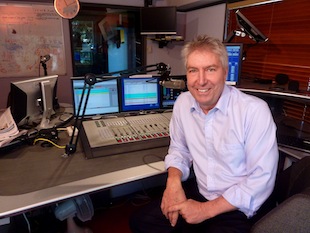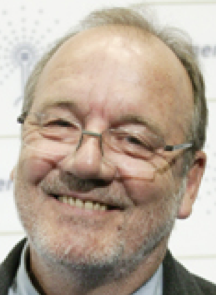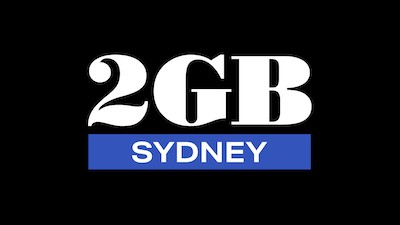One on One with Ron E Sparks – pt 1

Greg Smith is an inductee into the Australian Radio Hall of Fame, and a Director of Radio Today.
There aren’t too many music jocks that are living legends.
Ron E Sparks at WSFM (left) is one of them.
Over the next couple of days Greg goes one on one with Ron. We find out who he idolised in the early days, why he moved from 2MMM to 2Day FM in 1994 and how he still manages to sound as excited about his job today as he did in the 70's.
Ron will also reveal the story behind how he turned down a lucrative McDonalds franchise to be a music jock.
Greg: Ron, how did you get into radio & what was your first on-air role like?
Ron: I was one of those young teens pressing their nose up against the studio glass at most Brisbane stations in the late 60's. I got a break when 4BC advertised for "a young swinger" (the exact words) to panel for their many horse racing broadcasts with the opportunity of training to be a DJ later on.
Greg: At 4BC who did you look to for advice?
Ron: Graham (then "Bob") Smith was the most helpful of the 4BC stars. Most of the other long serving announcers seemed to be pretty jaded by the radio business. I made a promise to myself never to be like that, and always reminded myself how radio excited me and how much I wanted to work in the business. It's a good reminder for all of us. To this day, when a new kid appears at the station, I'm always happy to help & I try to give them some early confidence.
 Greg: You idolised Rod Muir (right) & your dream job was to work for Rod at 2SM in Sydney. Tell us about that experience & what you learnt from working with Rod.
Greg: You idolised Rod Muir (right) & your dream job was to work for Rod at 2SM in Sydney. Tell us about that experience & what you learnt from working with Rod.
Ron: I thought getting ANY shift and actually living in Sydney would be the coolest thing that could ever happen to me. I scored the 2SM midnight to dawn shift in 1972.
Like many successful leaders Rod had that magic combination of knowledge, a winning swagger, but most of all salesmanship. Not selling radio spots or used cars, but selling ideas to people, from the jocks to the board of directors.
He took a motley crew of DJs from around the country, slipped us into a local variant of the Drake format, added his flair for promotion, and we set out to cause havoc with the Sydney radio establishment. I mean, when I first hit Sydney, legends like Ward "Pally"Austin & Bob Rogers seemed impregnable! Every step of the way was thrilling as we gradually took 2SM to number one.
Rod's salesmanship came to the fore in the 1980s when he "sold" the Fraser government on the idea of granting FM licences.
By the way Smithy, now would be a good time for you to explain what the Drake format was (laughs).
Greg: Todd Storz & Gordon McLendon may have invented Top 40 Radio but in the 1960s Programming Consultant Bill Drake revolutionised it. He cut commercial content, severely limited DJ chatter and paired the songs down to 2 minutes enabling his stations to play 14 songs an hour. Using acapella jingles & an up-tempo presentation, he created what he called Boss Radio. The Drake format took stations to the top all over the U.S.
Greg: You also spent time as a PD at 3XY in Melbourne. Was it everything you expected it to be?
Ron: Yes and no. I think I was quite good at jock knowledge, promos, etc., and 3XY was in an exciting growth phase, but my biggest blind spot was development of the breakfast slot. There was very little science to breakfast back then. I'm not sure the current generation of Content Directors realise how much knowledge they can access when it comes to breakfast strategies and personality development etc.
Hang on, YOU were one of those 3XY jocks Smithy, what did you make of me?
Greg: The thing I liked about you was your passion to do it better. You were practising (Kaizen) continuous improvement before the Japanese came up with it.
Ron: I'm sure you'd agree that one of the best things about 3XY was getting to work with legendary production man Brian Newington. He taught me to write promos, then read 'em properly! I was so green! One of the best mentors of my career.
Greg: You could write a book about what went on behind the scenes at 2SM. What’s the most outrageous or funniest thing that happened during your time there?
Ron: The funniest stories came out of the old 2SM building in Clarence Street, probably because it was still populated by ageing employees who harked back to the days of radio serials, I'm not joking. And because of 2SM's ownership, many of them were devout Catholics. Nothing wrong with that, except that it made for a total culture clash with the young jock "element".
The funniest stories involved sneaking teenage girls and booze (not necessarily at the same time) past the 80-something night shift doorman. If he'd only looked more closely, he would've noticed that most of the jocks’ bags & jackets took on truly bizarre shapes with all that stuff (and even people) underneath.
There was also the tantrum when DJ Mad Mel took to the window ledge of Rod Muir's office threatening to jump. Sadly, it was explained to Mel that Rod's office was only on the 2nd floor and he'd just make a mess of himself, so he called it off.
Greg: After 8 years at 2SM you decided to take on the programming job at 2UW. How did that come about?
Ron: The Albert family (yes Albert Records, AC/DC, Angels etc.) owned 2UW and at gigs and get-togethers I would often talk to Ted Albert (now the late Ted) about radio. He was sitting on a multi-million dollar empire, but you could tell he was a genuine radio junkie.
When 2UW's biggest star, John Laws, announced he was leaving, Ted offered me the PD gig for taking 2UW back to a CHR format, the format which made it famous in the 1960s.
Not long after, in one of the more bizarre episodes of my career, Lawsie's book claimed that I gave him “no choice" but to leave 2UW. Huh?
 Greg: You got to work with the guy who’s credited with inventing call-out music research, U.S. Programming Consultant Todd Wallace (left). Many CHR programmers also credit Todd as a mentor. What are the key things that Todd taught you?
Greg: You got to work with the guy who’s credited with inventing call-out music research, U.S. Programming Consultant Todd Wallace (left). Many CHR programmers also credit Todd as a mentor. What are the key things that Todd taught you?
Ron: Well, first of all Todd taught me that you CAN get away with 90 minute song rotations on your hots. But only if the conditions in your market are right.
Firstly, you wanna be sure that your hots are REAL HOT. The other thing is our competition had been seduced into the trend of playing "selected album tracks" as part of their daily rotations. We soon crashed that party.
Once we'd announced our arrival, we settled down to 2 hours on the hottest rotations.
He IS a terrific teacher. He gets you into some great ways of thinking about radio that stay with you forever. It's not just the music that he likes to research. An example? Well, we've all been in those meetings where somebody says "hey we gotta get onto the pogo stick trend, EVERYBODY is into pogo sticks!" That person MAY be right, but you owe it to yourself & the team to use every resource available to confirm it before you commit. You can't be spending research dollars on EVERY decision, but you can call ad agencies, sports stores, school associations or whatever is appropriate to underpin your decision. And once you know your decision is solid it also gives you a corporate confidence that will be reflected in your strategies.
Todd's also great with the basics, sometimes stripping away great chunks of your station, and then rebuilding with new flair and purpose. I can name a few stations that could do with a dose of that right now.
As a PD, I loved the way he'd come to town, listen for a day or so, and then ask us why we were doing the things he heard. Most of the time our reasoning would stack up, but if you found yourself saying "because we've always done it that way" you knew it was time to re-evaluate.
Most of all, I liked the way he would never criticise anything unless he had at least a couple of alternate ideas to offer in its place. There are a few consultants who could take a tip from that.
Todd also taught me that a cold can of Pepsi can accompany ANY food item. We'd often meet at breakfast, Todd with his sunny side-up eggs and, yes, two cans of Pepsi on the side.
Greg: During your time at 2UW you experienced numerous highs & lows. What did you learn from that experience?
Ron: Being first to use the Wallace audience research, we were able to catch the market napping in 1981, and we took 2UW from "worst to first" (yes, that's a Todd Wallace promo line) in a very exciting ride to the top.
I learned lots of programming tricks at that time, but within 3 years, AM music stations were haemorrhaging listeners to the new FM stations. It's true what they say, in times like that you learn a lot about yourself and those around you.
I still think it was unfair of the federal government not to allow those long serving AM stations to upgrade to FM. Let's be honest, it's just a technical improvement. TV stations were allowed to upgrade to colour transmission, yet many AM stations who'd served their communities perfectly well for decades were sent to the bottom of the harbour.

In part 2 of Greg's chat with Ron E Sparks here, we find out why he moved from 2MMM to 2Day FM in 1994 and how he still manages to sound as excited about his job today as he did in the 70's.
Ron will also reveal the story behind how he turned down a lucrative McDonalds franchise to be a music jock.


